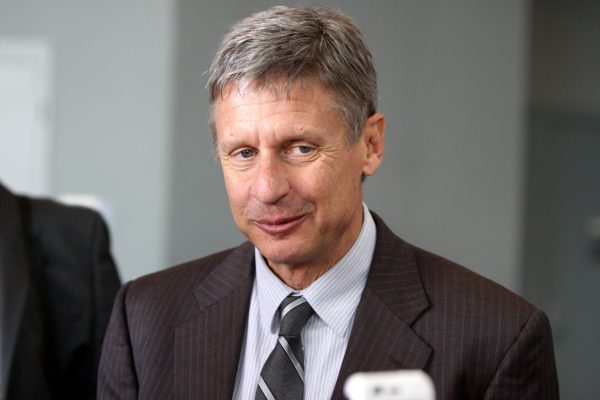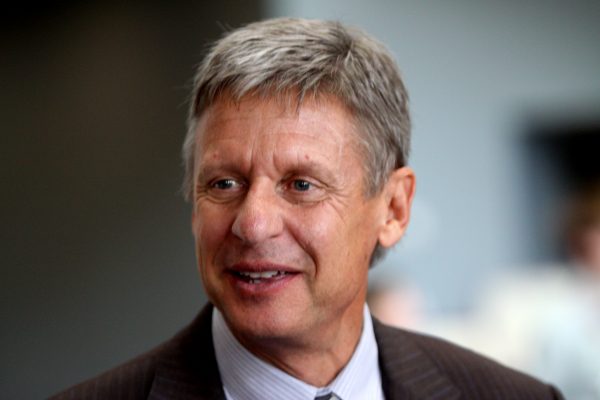Johnson Should Know What Aleppo Is, And So Should We
September 28, 2016

On Sept. 8, 2016 Gary Johnson, the Libertarian presidential candidate, was interviewed by MSNBC broadcaster Mike Barnicle. Barnicle asked Johnson “What would you do, if you were elected, about Aleppo?” Under normal circumstances, the politician would respond with a vague answer regarding the crises and move on from the topic as quickly as possible. However, that wasn’t the case. Johnson responded with the question “What is Aleppo?” As many of our instinctual responses would have been, Barnicle immediately reacts with the follow up question of “You’re kidding?”
The interview continues, but like me, many stopped paying any attention to whatever Johnson had to say in order to recuperate from that horrible “slip up” as he later called it.
Johnson, who is already not able to participate in the first presidential debate because he has not been able to reach the 15 percent requirement in five national polls, has continued to remain stagnant in his numbers at 8.7 percent and will not likely increase in time for the second Presidential debate on Oct. 4th.
Johnson’s biggest argument to defend this gaffe has been that Trump has said things far worse than he has.yet the Aleppo incident has caused a far louder uproar than any of Trump’s racist and politically incorrect comments. Although it seems to be a pretty strong argument, these outlandish comments have largely been responsible for the shocking growth of Trump’s momentum. Also, the media has given Trump 62 percent of all election coverage since he announced his run for president in June 2015. It outrages many, but it still makes Trump gain numbers in the polls, as he is now practically tied with Hillary Clinton, which is clearly not the case for Johnson.
The American news media has focused its attention on Trump’s campaign and what gets the most ratings, rather than what is truly important and what is affecting foreign policy. Two of the most important foreign policy issues have been the Syrian Civil War and how it has affected civilians, and the refugee crisis that has overwhelmed most neighboring countries and some in Europe.
To make matters worse, The New York Times published an article about Johnson’s error, but the article consisted of similar errors about Aleppo. The New York Times made the mistake that Aleppo was not only the capital of Syria, but was also the de facto capital of ISIS. It was later corrected, for those who may not know Damascus is the capital of Syria and Raqqa is the de facto capital of ISIS. Not only are these errors incredibly embarrassing but they seem to underestimate Aleppo’s significance.
Aleppo is Syria’s largest city and the largest target for the Assad Regime since the start of the civil war in 2011. The city has been invaded with multiple chemical attacks, barrel bombs and Russian airstrikes, and the majority of the casualties are civilians, specifically children.
According to a frontline article published in Feb. 2015, a total of 470,000 Syrians have been killed, 50,000 of them being children. This article was published over six months ago, and that number increases daily.
Since 2011 the civil war has caused over 4.5 million Syrians to flee the country and turn to their neighboring countries such as Jordan, Turkey and Lebanon to seek asylum.
Unfortunately, these neighboring countries were not expecting such an influx of refugee. This has caused tension within these countries on how to handle the overwhelming situation.
In the most recent news, there has been a ceasefire between Assad’s Syrian Army and the rebel fighters. Unfortunately, that cease-fire came to an end within one week, after the United States accidentally conducted an airstrike that hit Syrian soldiers instead of what was believed to be an ISIS target. Russia struck an aid convoy that was near Aleppo, officially ending the cease-fire. Aleppo was later hit with another 35 airstrikes, ultimately cancelling any further UN humanitarian aid.
The city of Aleppo shows us that there is a huge humanitarian crisis, and the fact that Gary Johnson had a “slip-up” as to what Aleppo was is unforgivable and worrisome considering it is such a big issue. These “slip-ups” have caused a general concern regarding what his knowledge actually consists of. This is not the first time Johnson has “blanked out” on topics so crucial. Even though he apologized for his mishap, it is this kind of mistake that makes you question the coherence of a person when they are running for President of the United States.










